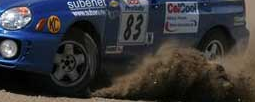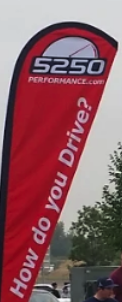 Buying a Rally Car | Most Subaru owners dream of rallying their car, so when were you going to do that? at some point?
Buying a Rally Car | Most Subaru owners dream of rallying their car, so when were you going to do that? at some point?
The Subaru has Rally embedded in its metal / DNA.
News Flash: There’s a very big difference between a road car and true rally car though. Building a road car into a rally car is a very long and expensive process. Oftentimes, it is better to buy one than convert your street car.
There is also no "going back to stock". That's why buying a used race car might be the best way to get into racing without destroying your own car and / or getting a second mortgage on your home to satisfy that rally itch (and it never really goes away once you have it).
How to buy a Rally Car: Here are 10 things to look for on a used rally car before you buy it:
![]() 1. Roll Cage - This is the heart of any professional racing vehicle. When the worst happens, and it does, this is what allows you to walk away. You want to find out who built the cage and if they are reputable. The cage needs to be checked against the current rules to make sure it is still legal. Inspect the cage for signs of previous impacts, any damage will need to be repaired and the frame checked for straightness. If the cage doesn't look right or the welds look sloppy, get a second opinion or walk away (before that cage is challenged in the event of an accident).
1. Roll Cage - This is the heart of any professional racing vehicle. When the worst happens, and it does, this is what allows you to walk away. You want to find out who built the cage and if they are reputable. The cage needs to be checked against the current rules to make sure it is still legal. Inspect the cage for signs of previous impacts, any damage will need to be repaired and the frame checked for straightness. If the cage doesn't look right or the welds look sloppy, get a second opinion or walk away (before that cage is challenged in the event of an accident).![]()
2. The Body - The body of the car can take quite a beating without effecting the overall performance of the vehicle. If the car looks like a clown car with every panel a different color, suspect lots of contact or off track excursions. The most important aspect of the body is that the frame is straight and true. If the frame is bent, the alignment will never be right (and you will be left wondering why it just won’t ‘hook up’ like the other cars).
3. Motor - The motor can be tough to feel out before a purchase. Check the oil, make sure it has some, look for metal particulate and any discoloration or milkiness. Ask how many hours / miles / races are on the motor. Keep in mind that depending on the level of competition, the motor may only be designed to last a few races. Be suspect of a new motor, it may be a built out of spare parts, if there is any doubt, have a professional shop look at it. Remember you should never go into the idea that a racing motor is much like a street motor, they are different on many levels.
4. Transmission - If the car comes with a motor (some won't), they usually come with a transmission attached. As with the motor, ask how many miles / races are on the transmission and if regular rebuilds are required. Many racing vehicles run almost stock transmissions that need very little maintenance, while others require re-gearing between stages or complete rebuilds every race to replace clutch packs. Make sure the sequential gearbox you're drooling over is legal for the class of racing you are interested in. If there is a box of spare parts that come with it, check that box to get a feel for what parts wear out. Not every driver will shift the same. If the owner grew up shifting chevy M22’s and this is a Subaru or Nissan, chances are that the driver tore up gearboxes.
5. Suspension - This is an area you can usually expect to have to replace most if not all of the setup after your purchase. Racing shocks require regular rebuilds and adjustments and you can count on the most recent maintenance items not being done.
You might get lucky and score items that can't wear out like aluminum control arms and links and maybe some sway bars, but expect to replace the shocks and get a good alignment before your first race. It is also a good idea to ask about the set-up data for shocks / suspension. This can help you start out with a decent set up before you start changing settings to 'improve’.
6. Brakes - Racing brake calipers are expensive, and fit many cars. Make sure the brakes on the car are proper for the type of racing your are doing. Don't fret over the wear level of the rotors or pads. These are wear items that will need to be replaced frequently.
If the car has sliding calipers when it's supposed to have Brembo's? Take $4500 off the asking price. Brembo brakes are famous for a reason, they work very well when set up properly.
7. Wheels and Tires - Tires are wear items. If the car comes with a set that isn't showing cord, consider yourself lucky. You got a free set. The set of rims on the car should be structurally sound, with only aesthetic damage. Many race cars are sold with multiple sets of rims. Find out if more than one set is included with the car.
8. Safety and Data Systems - Some race cars are sold ready to race with all the safety equipment still installed and functional. Some cars also have a full data allocation system as well. If these are included with a car you are looking at, find out when the last time the car passed a safety inspection was.
Check the fire system to see if it is expired or not. Check the electrical safety system for functionality. Find out if the data system is functional and that any required computer cables or software is supplied.
9. Spares - If a racing team is serious about their season, they will have a good amount of spare parts for their car. Most race cars are sold with a complement of spare parts. This can range from some wheel and brake parts, to new engines and transmissions.
A lot of spares may mean a lot of time replacing parts. If you are new to the sport, concentrate on finding a good starter car, not one with the most spare parts. The spares can account for 50% or more of the cost of a race car package.
10. The walk around / inspection: Talk to others who know more about the vehicle as a rally car than just someone who owns a street version. Checking suspension for tightness, steering for feel, all fluids, log book, windshield, and how the doors close, the list goes on.
These are just a few key areas to focus on. Whenever possible, you should have a professional race mechanic / performance shop look at the car before purchasing. If the seller won't let you take the car to a pro, take a pro to the car. There's no 3 year 36000 mile warranty in rally racing



